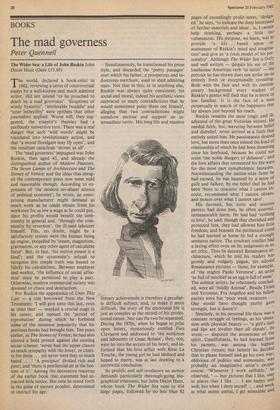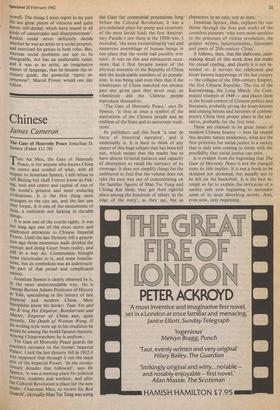BOOKS
The mad governess
Peter Quennell
The Wider Sea: a Life of John Ruskin John Dixon Hunt (Dent £15.95) he world, declared a book-critic in
1 1862, reviewing a series of controversial essays by a well-known and much admired writer, did not intend `to be preached to death by a mad governess'. 'Eruptions of windy hysterics', 'intolerable twaddle' and `utter imbecility' were epithets that other journalists applied. Worse still, they sug- gested, the essayist's theories had a perilously subversive turn. There was a real danger that such 'wild words' might be translated into revolutionary action, and that 'a moral floodgate may fly open', and the resultant cataclysm 'drown us all'.
The 'mad governess' impugned was John Ruskin, then aged 43, and already the distinguished author of Modern Painters, The Seven Lamps of Architecture and The Stones of Venice; and the ideas that enrag- ed the contemporary press now seem mild and reasonable enough. According to ex- ponents of 'the modern soi-disant science of political economy', he wrote, an enter- prising manufacturer might demand as much work as he could obtain from his workmen for as low a wage as he could pay, since his profits would benefit the com- munity in general and, 'through the com- munity by reversion', the ill-paid labourer himself. This, no doubt, might be a satisfactory system were the human being an engine, propelled by 'steam, magnetism, gravitation, or any other agent of calculable force'. But, in fact, 'his motive power is a Soul'; and the economist's refusal to recognise this simple truth was bound to falsify his calculations. Between employer and worker, 'the influence of social affec- tion' must be permitted to play a part. Otherwise, modern commercial society was doomed to chaos and destruction.
For Ruskin the appearance of Unto This Last -- a title borrowed from the New Testament: 'I will give unto this last, even as unto thee' — marked a crucial stage in his career, and opened the 'period of reprobation' during which he forfeited some of the immense popularity that his previous books had brought him. Ten years earlier, in The Stones of Venice, he had also uttered a bold protest against the existing social scheme: 'never had the upper classes so much sympathy with the lower, or chari- ty for them ... yet never were they so much hated ... "A precipice' divided rich and poor; and 'there is pestilential air at the bot- tom of it'. Among the decorative traceries of the earlier book that statement had at- tracted little notice. But now he stood forth in the guise of earnest prophet, determined to instruct his age.
Simultaneously, he transformed his prose style, and discarded the 'pretty passages' over which his father, a prosperous and in- dustrious merchant, used to shed admiring tears. Not that in this, or in anything else, Ruskin was always quite consistent; his social and moral, indeed his aesthetic views embraced so many contradictions that he would sometimes point them out himself, alleging that two contradictions might somehow enclose and support an in- termediate verity. His long life and massive
literary achievement is therefore a peculiar- ly difficult subject; and, to make it more difficult, the story of his emotional life is just as complex as the record of his profes- sional career. Nor can the two be separated. During the 1870s, when he began to print open letters, mysteriously entitled Fors Clavigera and addressed to 'the workmen and labourers of Great Britain', they, too, were let into the secrets of his heart, and in- formed that his love affair with Rose La Touche, the young girl he had idolised and hoped to marry, was at last drawing to a sorrowful conclusion.
So prolific and self-revelatory an author demands particularly thorough-going bio- graphical treatment; but John Dixon Hunt, whose book The Wider Sea runs to 414 large pages, followed by no less than 82 pages of exceedingly prolix notes, 'design- ed,' he says, `to indicate the deep hinterland of further materials and ideas', is, I cannot help thinking, perhaps a little too voluminous. His purpose, we learn, was to provide 'a life ... based upon re- assessment of Ruskin's mind and imagina- tion' and give us 'a fresh model of his per- sonality'. Although The Wider Sea is lively and well written — despite his use of the loathsome American verb `to intuit' — the portrait he has drawn does not strike me as entirely fresh or exceptionally revealing. Both with the face and with its contem- porary background every student of Ruskin's genius will find that he is more or less familiar. It is the face of a man perpetually in search of the happiness that lay always just beyond his reach. Ruskin remains the most tragic and ill- adjusted of the great Victorian writers. He needed faith, but, wavering between belief and disbelief, never arrived at a faith that entirely suited him. He passionately desired love, but more than once missed the kind of relationship of which he had been dreaming since his boyhood, because he could not resist 'the noble dangers of delusion', and the love affairs that tormented his life were for the most part nympholeptic fantasies. Notwithstanding the nation-wide fame he had earned, he was haunted by a sense of guilt and failure, by the belief that he had been 'born to conceive what I cannot ex- ecute, recommend what I . cannot obtain, and mourn over what I cannot save'.
His devoted, but stern and anxious parents had done him, he often asserted, immeasurable harm. He had had 'nothing to love', he said; though they cherished and protected him, they had allowed him little freedom; and beneath the puritanical creed he had learned at home he hid a strongly sensuous nature. The resultant conflict had a lasting effect even on his judgments as an art critic. Thus he detested Renaissance ar- chitecture, which he told his readers was grossly and vulgarly pagan, yet adored Renaissance pictures — those, for example, of 'the mighty Paolo Veronese', an artist 'as full of mischief as an egg is full of meat'. The noblest artists, he reluctantly conclud- ed, were all 'boldly Animal'. Beside Titian and Veronese, Fra Angelico and his fellow purists were but 'poor weak creatures . • • One would have thought purity gave strength, but it doesn't'.
Similarly, in his personal life there was a constant struggle of feelings, as his obses sion with physical beauty — 'a girl's hair and lips are lovelier than all clouds', he wrote — disputed the attractions of the spirit. Unselfishness, he had learned from his parents, was among the highest Christian virtues; but latterly he decided that to please himself and go his own way, oblivious of politics and economics, was probably an imaginative artist's proper course. 'Whenever I work selfishly,' he observed, — buy pictures that I like, stay in places that I like ... I am happy and well; but when I deny myself ... and work at what seems useful, I get miserable and unwell. The things I most regret in my past life are great pieces of virtuous and quite heroic self-denial; which have issued in all kinds of catastrophe and disappointment'. Ruskin could never definitely decide whether he was an artist or a social prophet, and exercised his genius in both roles. But, whereas social problems are apt to be changeable, Art has an unalterable value; and it was as an artist, an imaginative master of language, that he became the vi- sionary guide, the powerful `esprit in- tercesseue, Marcel Proust would one day follow.







































 Previous page
Previous page